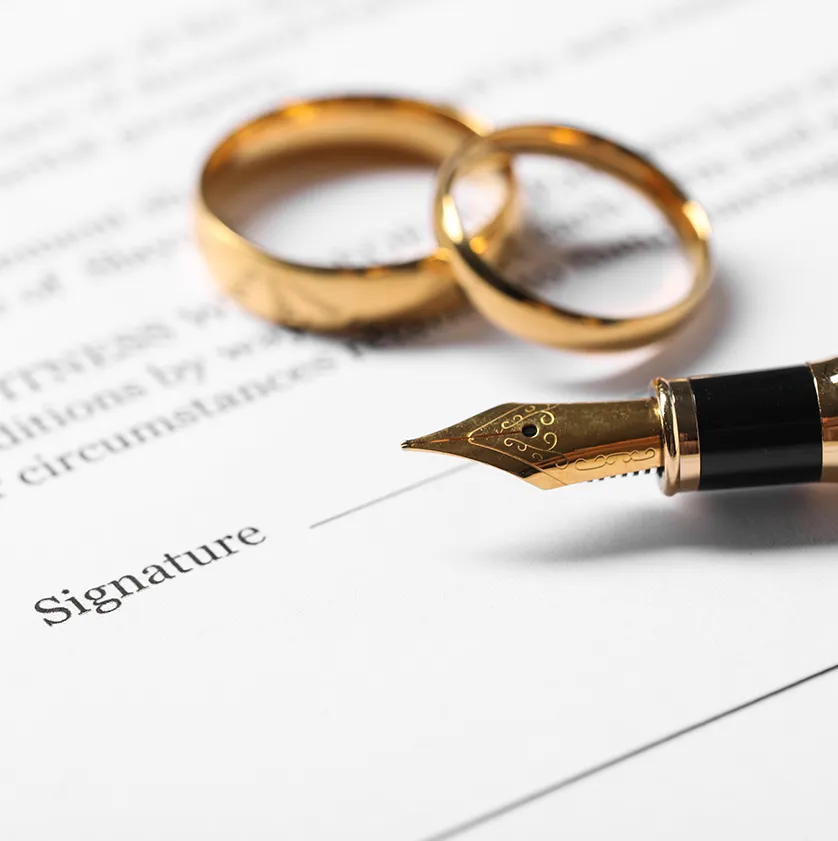Ready to Redefine What Divorce Looks Like?
Let’s talk about how to move forward without the fight.
Book Your Free Call Attend Our Divorce WebinarLooking to get married in Georgia but worried about what will happen to your assets in the event of divorce? A prenuptial agreement can help ease those concerns. But what exactly is a prenup, and who needs one?
In this guide, we’ll cover everything you need to know about prenuptial agreements in Georgia, including what they are, their benefits, common misconceptions, and how to talk to your partner about them.
A prenuptial agreement, also called a “premarital agreement” or “antenuptial agreement,” is a legal document that spouses sign before getting married. It lays out how their assets and property will be divided if they ever get divorced or separate. Prenups can also cover other important topics, like spousal support and inheritance rights.
While prenups aren’t for everyone, they can be a useful tool for many couples. There are also alternatives, like postnuptial agreements (signed after marriage) and cohabitation agreements (for unmarried couples).
Prenuptial agreements can offer several advantages for couples, some of which include:
A prenup can help safeguard assets that were acquired before the marriage, ensuring that they remain with the individual spouse and are not considered marital property. This can minimize conflicts in the case of a divorce and provide clarity on which assets are separate.
While nobody wants a marriage to end in divorce, a prenup can help ensure that if it does happen, the process remains amicable. By establishing the terms of asset division and spousal support beforehand, it minimizes disagreements and misunderstandings, providing both spouses with clarity and security.
A prenup can outline the financial responsibilities of each spouse during the marriage, such as debt payments or management of joint accounts. This can help prevent conflicts over financial matters and promote openness in the relationship.
While prenuptial agreements can be beneficial for many couples, some may find them more necessary than others. Anyone who falls under the following categories should consider getting a prenuptial agreement:
Couples with significant assets can benefit from a prenuptial agreement by protecting their individual assets in case the marriage ends in divorce. In the absence of a prenup, comingled assets acquired before the marriage can be considered marital property and subject to division between both parties in a divorce settlement. However, a prenuptial agreement can specify how these assets should be handled and kept separate from marital property.
Couples with children from previous relationships can benefit from a prenup because it allows them to provide for their children’s financial security in the event of their death. Without a prenup, the surviving spouse could inherit the majority of the estate, potentially leaving less for the children from the previous relationship.
Couples who are near retirement age may have accumulated significant assets, including retirement accounts, over the course of their careers. These retirement accounts may represent a significant portion of their net worth and financial security, and protecting them in the event of a divorce may be crucial.

A prenuptial agreement can be particularly important for couples where one or both parties own a business or professional practice. In the absence of a prenup, the business may be considered marital property and subject to division in the event of a divorce. This can lead to significant financial losses, disruption of business operations, and even the potential loss of the business.
A prenuptial agreement can benefit the spouse with fewer resources by providing financial protection in case of a divorce. If the less wealthy partner did not work during the marriage or had a lower income, a prenup can ensure that they are financially taken care of in the event of a divorce.
For example, a prenup can include provisions for spousal support or alimony. This can be especially important if one spouse gave up their career or put their own financial goals on hold to support the family during the marriage.
When it comes to prenuptial agreements, it’s crucial to understand that there are certain restrictions in place to ensure fairness and prevent misuse. With this in mind, let’s explore the details.
In Georgia, child custody and child support cannot be part of a prenuptial agreement. These issues are determined based on the child’s best interests during a divorce. While a prenuptial agreement can lay out how assets and property will be divided, it cannot determine who gets custody of the children or how much child support will be paid.
Any terms in a prenuptial agreement that are illegal or unethical will not be upheld under Georgia law. This includes any provisions that encourage or incentivize behavior that is against the law or violates public policy.
A prenuptial agreement cannot include provisions that incentivize or encourage divorce. For example, a clause that states one party will receive a larger settlement if they are the one to initiate the divorce would be unenforceable.
It is important to note that prenuptial agreements must be fair and equitable to both parties. If a prenuptial agreement is heavily weighted in favor of one spouse and the other party did not fully understand the agreement or sign it willingly, it may be considered invalid in court.
Yes, prenups are legally binding in the state of Georgia, provided that they meet certain requirements. In order for a prenuptial agreement to be considered valid and enforceable in court, it must meet the following criteria:
If a prenuptial agreement meets all of these criteria, it should be considered valid and legally binding in Georgia. However, it is important to note that even if a prenuptial agreement is considered valid, it can still be challenged in court. For example, if one party can prove that the agreement is no longer fair and reasonable, a court may choose to invalidate some or all of the agreement.
Discussing a prenuptial agreement with your partner may seem daunting, but most people agree that it is an important conversation to have before getting married.
When approaching the topic, it is essential to approach it with transparency and openness. You can start the conversation by discussing the benefits of having a prenuptial agreement, such as protecting your individual assets and reducing the risk of disputes.
It is important to emphasize that the prenuptial agreement is not a sign of a lack of trust or commitment, but rather a tool for planning and protecting both parties’ interests. You can also make sure that your partner understands that you are not asking for the prenuptial agreement to favor one spouse over the other, but rather to ensure a fair and equitable resolution in the event of a divorce.
If you’re getting married in Georgia and considering a prenuptial agreement, it is crucial to work with an experienced divorce attorney to ensure that your prenuptial agreement is legally valid and enforceable in the state of Georgia. At Atlanta Holistic Family Law, our experienced family law attorneys can provide you with reliable legal advice and guidance on the process of creating a prenup that meets your specific needs and protects your assets.
We offer a free consultation to answer your questions, discuss your options, and help you make an informed decision. Contact us today to schedule your free discovery call and take the first step towards a secure future with the peace of mind that comes with having a solid prenuptial agreement in place.
Please note: this information is not intended to serve as legal advice. It is solely meant to provide general information about prenuptial agreements in Georgia. It is important to consult with an experienced family law attorney to discuss your specific situation and to ensure that any agreements you enter into are legally valid and enforceable in Georgia.
Schedule a call with our team
Let’s talk about how to move forward without the fight.
Book Your Free Call Attend Our Divorce Webinar
Summary: Deciding whether to leave a marriage is one of the most difficult decisions you’ll face. This guide explores the signs that...

Many spouses wrestle with whether their marriage is worth saving or whether separation is healthier. Recognizing the signs a marriage can’t be...

In family law, reaching a resolution outside of court is often ideal—but it’s not always possible. When you and your spouse or...

When a marriage ends because of betrayal, the emotional toll can be overwhelming—especially when children are involved. If you’re in the middle...

Few things frustrate co-parents more than a child’s clothes, toys, or personal items disappearing—or not returning—after parenting time with the other parent....

When you’re in the middle of a custody dispute, it’s natural to want a clear answer: What do judges actually care about?...

When a parent fails to show up for their scheduled parenting time, the emotional fallout often lands hardest on the children. Missed...
Let’s talk. We’ll listen to your situation and help you take the next best step.